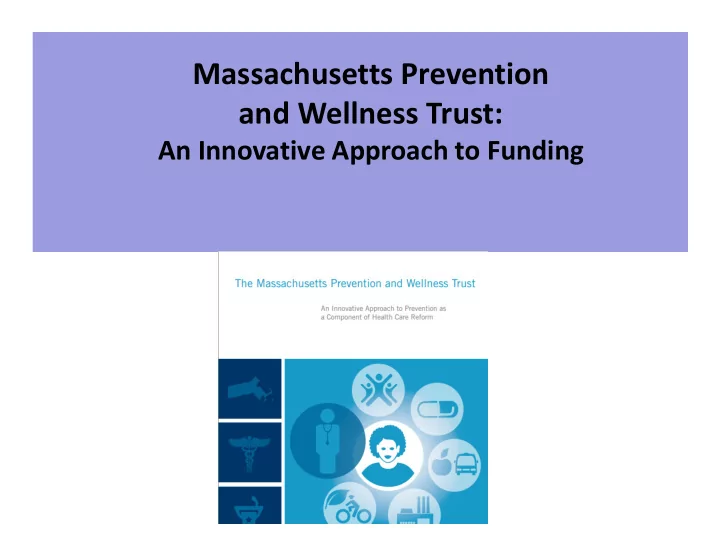

Massachusetts Prevention and Wellness Trust: An Innovative Approach to Funding
Health Reform in Massachusetts • Major health reform law passed in 2006 • Initial focus on insurance coverage – 97% covered and 91% with primary care MD • 2012 legislation aimed at cost and quality (Chapter 224) • Created workplace wellness incentives, health planning and…Prevention and Wellness Trust (PWTF)
Prevention Trust Provisions • $60 million in trust for 4 years • Funding: assessment of insurers & large providers • Flexibility about spending per year • 75% was for grantee awards • Up to 10% on worksite wellness programs • Up to 15% on administration through MDPH MGL Chapter 224, Section 60
What Conditions Created Environment for Trust • Solving access led to more focused attention on cost and quality • Costs continued to grow unabated despite many efforts to control growth • Successful example of Mass in Motion prevention initiatives (money in districts; good buzz on population health) • Strong consumer and advocacy orgs: continued existence after 1 st reform bill 4
Award Requirements • Applicants had to include clinical providers, community-based organizations, municipalities, health plans, regional planning agencies and/or work sites – Enhance community-clinical partnerships – Address barriers to optimal health – Track referral of patients from health care to community services and back • Had to focus on priority areas of childhood asthma, elder falls, tobacco use and/or hypertension 5
PWTF Chapter 224 Guidelines All expenditures should: • reduce rates of preventable health conditions; • increase healthy behaviors through evidence- based interventions; • increase adoption of workplace-based wellness programs; • address health disparities; • further develop the evidence-base
Information Exchange Network Resource #1 NextGen (Tobacco Quitline) Resource #2 AthenaHealth Referral Referral (YMCA) Data Data Public Domain-e-link Items Items Resource #3 -Secure transmission Epic -HIPAA compliant ( Councils on Aging) -Universal Translator -Vendor Agnostic Feedback Feedback Resource #3 eClinical Works Data Data (local VNA) EMRs to make e-Referral available Resource #5 GE Centricity to all their clinical sites. (walking groups) Other EMRs Etc. Etc. Etc
Grants Awarded in Dec. 2013 Number of awards: 6 to 12 Average Size of Awards: • Year 1: ~$250,000 per awardee (capacity-building) • Year 2: ~$1,100,000 - $2,200,000 per awardee (implementation phase) • Year 3: ~$1,200,000 to $2,500,000 per awardee (implementation phase) • Year 4: $1,100,000 - $2,200,000 per awardee (transitioning to sustainability phase)
Acknowledgements • Commissioner Cheryl Bartlett and Bureau Director Tom Land, MDPH • Northeastern University – Bouve School • Robert Wood Johnson Foundation Full report on the Trust Fund at: www.northeastern.edu/iuhrp 9
Recommend
More recommend